The Waterbury Symphony Experiences Venezuela’s El Sistema
Leif Bjaland, WSO Music Director:
My experience teaching in Venezuela has given me a new sense of what is possible in music education. In Acarigua, instrumental training has an organic, “coming from the inside” feeling. When I was learning how to play baseball as a kid, I just played baseball, pretty badly at first and better as time went on. The only teachers on the sand lot were the other kids, who all played better than me.
In Venezuela, I saw this same dynamic at work when I coached the orchestra’s woodwind section. During rehearsals here was a constant murmur, as older students (some were in their late teens) helped younger students (a few were just beginners,) helped with embouchure, fingerings, intonation and style. The group was an evolving, self-correcting organism. It was a dynamic process, and for someone trained in the more regimented style of American music education, it was simultaneously disorienting and exhilarating!
I came to realize that this is a much more effective way of teaching instrumental skills. The competition that is so much a part of my training (challenging to get a better seat or into the top ensemble) is completely absent in Acarigua. The orchestra included all skill sets and there were no second-class citizens. As a result, everyone was invested in helping each other to play the music better. And it did get better, quickly and dramatically better! The sense of joy and empowerment these students displayed as they performed the final concert was a wonderful thing to witness.
Steve Collins, WSO Executive Director:
My expectations of the El Sistema experience were grounded in some fairly extensive conversation with people, (Americans), who had been there. So I was entering Venezuela with a pretty good picture of how things might look and feel. In fact, in general, I was imagining a more chaotic and haphazard educational environment than was actually in place. The fact we were participating in a special “seminario” probably had something to do with the level of organization. Also, the students who knew the local “nucleo” well were very helpful in moving things along and organizing sessions. The Venezuelan culture, communication style and pace were not unlike other far flung places I have visited, although the language barrier was difficult for me.
My lack of Spanish speaking skills was difficult for me at first, particularly because I was usually alone with the percussion students, without any other English speaking people on hand. This, combined with an overwhelming variety of student’s skill level was quite daunting. Not only was there a huge range of student abilities, the advanced students had considerable “holes” in their knowledge and experience. I was absolutely awed by the advanced student’s level of technical ability and musicality. I had no idea so many of them would have such ability, yet lack understanding of some very basic concepts.
As we grew accustomed to one another, we worked out a mutual respect, admiration, and a delightful way of communicating using highly broken language, gestures, emotion, and occasionally, computer translation. As could be expected, the students were much more adaptable to me than I was to them. Their ability to learn musical skills was only trumped by their ability to learn my communication techniques. Mostly comical but sometimes maddening, we worked it out. Equally as impressive was the level of camaraderie and leadership among the students. Students serve as teachers, communicators, logistics managers, conflict resolution managers and personal mentors. Left to their own devices, as they often are, they form self-managing rehearsal groups, master classes, private lessons, and equipment maintenance teams. Not of obligation, but of the joy of making music and participating in something much bigger than themselves.
What I have taken away from the experience is simply a new understanding of what is possible when you remove all preconceived notions of “the best way” to learn and perform music. Remove all the actual and perceived barriers to great music education and that is exactly what you get. There are no excuses, no alibis, and no reasons not to excel.
- Very young students can play virtually any instrument.
- Students who have no personal or cultural experience with orchestral music can adopt it as their own.
- Students can teach their peers, and teach very well.
- Students of all ages can remain engaged for very large blocks of time.
- Students will work twice as hard as you have any right to expect of them.
- They can do these things because that’s what everyone else is doing. And no one tells them they can’t.
Calida Jones, WSO Bravo Program Administrator:
I had no expectations prior to my visit to Acarigua, Venezuela, as I had no idea of the concept of engaging a community of young people to become musicians on a scale such as El Sistema. I did, however, review the Sixty Minutes documentary regarding the El Sistema program, read Tricia Trunstall’s Changing Lives, and spent several weeks with the Baltimore Symphony Orchestra’s El Sistema-inspired program—OrchKids.
In contrast to my four months of on the job training, the Waterbury Symphony Orchestra personnel spent eighteen months researching all aspects of the program. Therefore, when I arrived to begin my tenure with this great musical program, I already had a deep love and passion for music, a desire to teach—and just needed a chance and channel into which to pour my enthusiasm and energy.
My expectations were derived from what was expected of me during my own learning experience, to include but not be limited to the following:
- Exceptional student performance—commensurate with the high quality of teaching techniques
- Exceptional excitement and enthusiasm—because it is the fulfillment of a dream for each student
- Employ teachers with a music teaching passion
I was amazed when I witnessed the El Sistema program in Venezuela as teachers engaged exceptional students proficient in technique and performance to help train and teach their peers. In my observation, this built confidence and accelerated the growth of these student teachers. Here in the US, we focus so much on having adults be the “leaders” and “teachers” when we are in fact arming children with the tools needed to be the leaders and teachers!
Being in an environment like Venezuela and El Sistema was phenomenal because, despite the deprivation, the children exhibited great energy and passion. El Sistema is such a refreshing approach to making music. This style of learning and teaching feels so much more organic than any other pedagogical approach I’ve encountered. There didn’t appear to be a special recipe for creating an environment for Venezuelan children to learn, other than intensity, repetition, and access for all. During my time there, some students attended every single day, some attended 50% of the time, and others came for one day. Not once did I see them being turned away. They always came with a willing attitude to learn, and a thirst and hunger for knowledge. Having knowledge of the background of the struggles these kids endure, how could I not share what I knew with them? They made me want to work harder to ensure that they had an unforgettable experience. Some days I was surprised at my own endurance of teaching that intensely.
After reflecting on my experiences there, both musically and personally, I took away these four things:
- All children are similar; that is they are like sponges waiting to absorb knowledge and understand life. It is my job as teacher, and mentor, etc., to ensure that they have access to quality learning experiences, musically and socially.
- No matter the age of the child, as long as they have a good teacher and someone willing to work with them, they can learn an instrument at any age.
- No matter their background musically, classical music cannot only become a part of their life, but they will begin to identify with it, and eventually fall in love with that style of music.
- I will help children to constantly raise their own expectations of themselves, and allow them the opportunity to blossom as often and as much as possible.

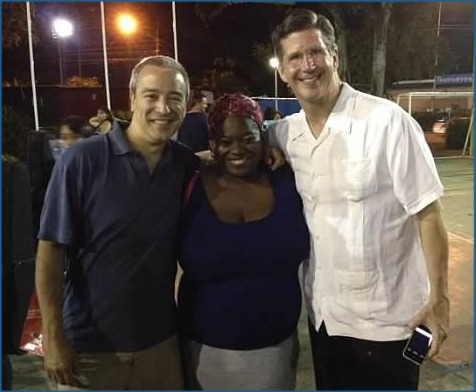
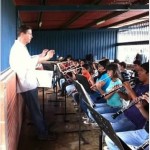
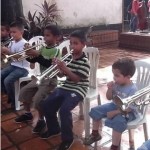
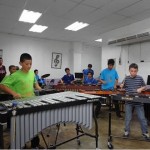
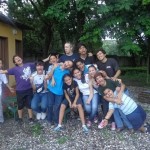
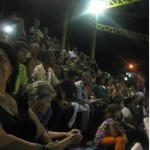
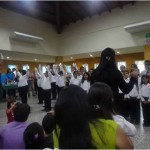

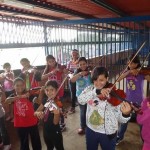
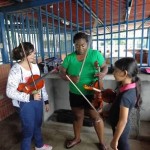
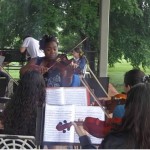
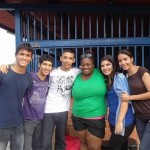
No comments yet.
Add your comment